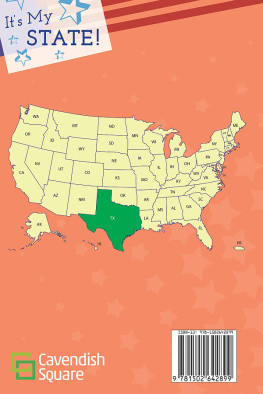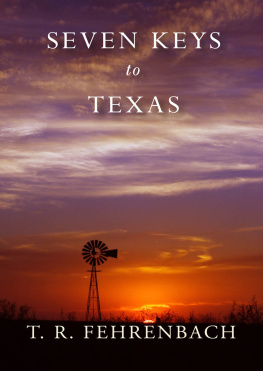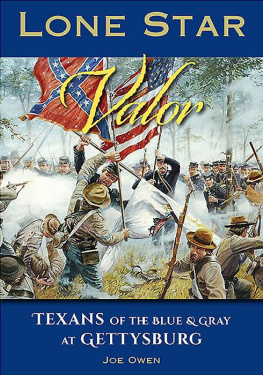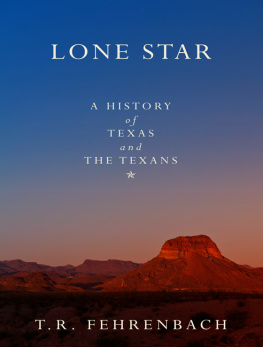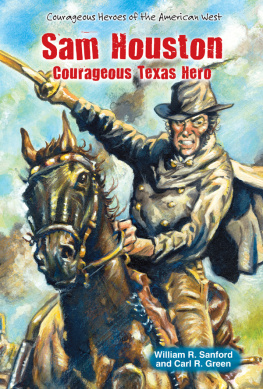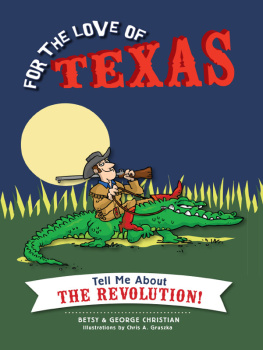


Published by The History Press
Charleston, SC
www.historypress.net
Copyright 2017 by Bartee Haile
All rights reserved
Front cover, top left: DeGolyer Library, Southern Methodist University, Lawrence T. Jones Texas Photographs; top right: RG5F0506b-03, Houston Public Library, HMRC; bottom left: RGD0005F2013, Houston Public Library, HMRC; bottom right: MSS399-17, Houston Public Library, HMRC.
First published 2017
e-book edition 2017
ISBN 978.1.43966.169.7
Library of Congress Control Number: 2017934944
print edition ISBN 978.1.46713.773.7
Notice: The information in this book is true and complete to the best of our knowledge. It is offered without guarantee on the part of the author or The History Press. The author and The History Press disclaim all liability in connection with the use of this book.
All rights reserved. No part of this book may be reproduced or transmitted in any form whatsoever without prior written permission from the publisher except in the case of brief quotations embodied in critical articles and reviews.
To the young Texans of today, especially my granddaughter Lila, with the hope you will never forget the Texans who came before you.
CONTENTS
ACKNOWLEDGEMENTS
Vintage photographs and illustrations do not grow on trees. You need to know where to look for them, and I have learned that the best places are the Houston Metropolitan Research Center and the DeGoyler Library at Southern Methodist University in Dallas. I dont know what I would do without Timothy J. Ronk and Joel Draut at HMRC, as well as curator of photographs Anne Peterson and Katie Dziminski and Terre Heydari at SMU. I also want to thank a first-time source, Randy Vance, with the Southwest Special Collections Library at Texas Tech.
Unforgettable Texans is the result of my first collaboration with Ben Gibson, my new editor at The History Press. I think it helped that he is a fellow Texan and, even more important, that he knows his stuff. Ben was a pleasure to work with, and I look forward to doing more books with him.
My final thank-you goes to my wife, Gerri, for her vital contribution to the finished product. With each book, she has taken on a bigger role by doing everything from proofreading to editing to helping me decide which forgotten Texans made the cut and which ones didnt. Gerri did a wonderful job, and I am, as always, truly in her debt.
INTRODUCTION
What makes some men and women memorable, while most are forgotten sooner or later? In Texas, the competition for our collective memory is understandably fierce. Our history was made by doers, people who came here from every state in the Union and more than a few foreign countries in search of something betterwhatever that happened to be at the time. Whether they found it or came up short, their personal struggles are a part of the story of Texas.
For the past thirty-four years, I have written a weekly newspaper column about all kinds of Texansthe good and the bad, the famous and the infamous and many who were well known in life but have been forgotten in death. Those are the Texans whose stories I most enjoy telling, because I believe they deserve a little immortality just as much as Houston, Austin, Travis and the other icons of the Lone Stars past.
As the first governor of Texas, James Pinckney Henderson had every reason to expect twenty-first-century Texans to at least recognize his name. Yet how many can place him? The same goes for Fabulous Tom Ochiltree, without a doubt the best-known Texan of the late 1800s; Ad and Plinky Toepperwein, the husband-and-wife trick-shot wizards; Harper Baylor Lee, the very first gringo matador; Boyce House, the most popular Texas author for more than a quarter of a century; and John Boles, the star of stage and screen from the 1920s until the 1950s.
On the other side of the historical coin, there are once-prominent figures whose present-day obscurity is their just reward. No secessionist was more zealous than Louis T. Wigfall, who gave Confederates, as well as Unionists, an incredibly hard time. Thomas Jefferson Chambers was a megalomaniac whose illusions of grandeur never matched the harsh reality of his selfabsorbed existence. After spending six years as a despised outcast in the U.S. Senate because he owed his seat to the Ku Klux Klan, Earle B. Mayfield was shocked to learn that practically no one wanted him to be governor.
There are other forgotten Texans whose anonymity can be explained. Harley Sadler, the tent-show maestro, was a household name in the small towns and rural communities of West Texas but unknown in the cities. Edward Mandell House, the master of behind-the-scenes politics, shunned the limelight to such an extent that he inadvertently guaranteed future generations would never know he turned Woodrow Wilson into a president. James Otto Richardson and Hubert Red Knickerbocker were recognized as, respectively, the admiral who warned FDR about Pearl Harbor and the foreign correspondent who exposed Hitler and the Nazi menacebut they werent recognized as native Texans even in their lifetimes.
Over the years, the question I am most often asked by readers of my newspaper column is how I find such interesting stories about Texans they never heard of. The answer is simple: I am always looking for people with an intriguing personal tale. When I do find them, my job is simply to let them tell their own story.
Thats what Ive tried to do with Unforgettable Texans. By the way, once you read about these Texans of yesteryear, they wont be forgotten anymore.
Bartee Haile
November 2016
THOMAS PECK OCHILTREE
Redheaded Ranger of the Rio Grande
Who was the best-known Texan in the United States and Europe in the 1890s?
Keep in mind that Houston, Austin and the rest of the San Jacinto generation were long dead and buried by the last decade of the nineteenth century. As for Governor James Stephen Hogg, the political giant of the period, his quaint surname rang few bells back east or overseas.
Give up? The answer is Thomas Peck Ochiltree (18391902), part-time politician and full-time bon vivant who, in his own words, sucked the orange of pleasure dry while extolling the infinite virtues of his adopted state as a colorful one-man chamber of commerce.
The life of the party never let the fact of his Alabama birth interfere with his claim that he was a native Texan. After all, Ochiltree argued, his father, for whom a Panhandle county is named, was a Lone Star Republic founder and brought him while still in diapers to the new nation.
Rebelling against parental plans for the priesthood, Tom ran away from home at sixteen and enlisted in the Texas Rangers. During an extended tour of frontier duty that featured hard-fought action against the Comanches and Apaches, the teenager earned the respect of his peers and the nickname Redheaded Ranger of the Rio Grande.
Thanks to his influential fathers string-pulling, Tom was granted a license to practice law by a special act of the state legislature despite having never cracked a law book. Upon joining the family firm, the practical joker revised the shingle: T.P. Ochiltree and Father, Counselors and Attorneys at Law.


